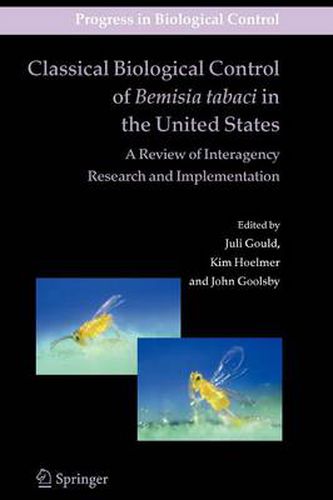Readings Newsletter
Become a Readings Member to make your shopping experience even easier.
Sign in or sign up for free!
You’re not far away from qualifying for FREE standard shipping within Australia
You’ve qualified for FREE standard shipping within Australia
The cart is loading…






This title is printed to order. This book may have been self-published. If so, we cannot guarantee the quality of the content. In the main most books will have gone through the editing process however some may not. We therefore suggest that you be aware of this before ordering this book. If in doubt check either the author or publisher’s details as we are unable to accept any returns unless they are faulty. Please contact us if you have any questions.
This book reviews interagency research and development of classical (importation) biological control of Bemisia tabaci (biotype B) conducted in the USA from 1992- 2002. The successful discovery, evaluation, release, and establishment of at least five exotic B. tabaci natural enemies in rapid response to the devastating infestations in the USA represents a landmark in interagency cooperation and coordination of multiple disciplines. The review covers all key aspects of the classical biocontrol program, beginning with foreign exploration and quarantine culture, through dev- opment of mass rearing methodology, laboratory and field evaluation for efficacy, to field releases, integration with other management approaches, and monitoring for establishment and potential non-target impacts. The importance of morphological and molecular taxonomy to the success of the program is also emphasized. The book’s contributors include 28 USDA, state department of agriculture, and univ- sity scientists who participated in various aspects of the project. Bemisia tabaci continues to be a pest of major concern in many parts of the world, especially since the recent spread of the Q biotype, so the publication of a review of the biological control program for the B biotype is especially timely. We anticipate that our review of the natural enemies that were evaluated and which have established in the USA will benefit researchers and IPM practitioners in other nations affected by B. tabaci.
$9.00 standard shipping within Australia
FREE standard shipping within Australia for orders over $100.00
Express & International shipping calculated at checkout
This title is printed to order. This book may have been self-published. If so, we cannot guarantee the quality of the content. In the main most books will have gone through the editing process however some may not. We therefore suggest that you be aware of this before ordering this book. If in doubt check either the author or publisher’s details as we are unable to accept any returns unless they are faulty. Please contact us if you have any questions.
This book reviews interagency research and development of classical (importation) biological control of Bemisia tabaci (biotype B) conducted in the USA from 1992- 2002. The successful discovery, evaluation, release, and establishment of at least five exotic B. tabaci natural enemies in rapid response to the devastating infestations in the USA represents a landmark in interagency cooperation and coordination of multiple disciplines. The review covers all key aspects of the classical biocontrol program, beginning with foreign exploration and quarantine culture, through dev- opment of mass rearing methodology, laboratory and field evaluation for efficacy, to field releases, integration with other management approaches, and monitoring for establishment and potential non-target impacts. The importance of morphological and molecular taxonomy to the success of the program is also emphasized. The book’s contributors include 28 USDA, state department of agriculture, and univ- sity scientists who participated in various aspects of the project. Bemisia tabaci continues to be a pest of major concern in many parts of the world, especially since the recent spread of the Q biotype, so the publication of a review of the biological control program for the B biotype is especially timely. We anticipate that our review of the natural enemies that were evaluated and which have established in the USA will benefit researchers and IPM practitioners in other nations affected by B. tabaci.